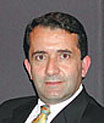

Zin
Smati
CEO and President of Tractebel Energy Services, Inc.
a subsidiary of Tractebel North America and part of the Suez Group
CEO and President of Tractebel Energy Services, Inc.
a subsidiary of Tractebel North America and part of the Suez Group
W-G: WHY DID TRACTEBEL LAUNCH TESI WHILE OTHERS WERE EXITING THE MARKET IN SEPTEMBER 2002?
ZS: Our confidence that we could succeed in a highly competitive arena is based on our belief in the deregulation model combined with superior customer service. Competition is the basis for our free enterprise system. Competition and therefore, deregulation drives down costs, inspires innovation, and ultimately spurs economic growth. With deregulation, customers choose their provider and the products and services to best allow them to control their budgets and manage their risks.
W-G: WHAT’S THE SIZE OF THE MARKET YOU ENVISION?
ZS: Retail energy represents the largest deregulated market. In the United States, commercial and industrial customers spend more than $190 billion annually on electricity and natural gas.
W-G: WHERE DOES TESI PROVIDE ITS PRODUCTS AND SERVICES?
ZS: Tractebel Energy Services provides retail energy and services to commercial and industrial companies in New York, Massachusetts, New Jersey, and Texas.
W-G: WERE THESE LOCATIONS SELECTED TO TAKE ADVANTAGE OF OPERATING ASSETS?
ZS: In North America, Tractebel currently owns and/or operates a total of 59 facilities that produce more than 3,127 MW of electricity generation, and operates the only liquefied natural gas (LNG) import facility in Massachusetts. TESI started selling electricity to businesses at a guaranteed, fixed price per megawatt for a stipulated period of time. We got a big boost from group synergies-selling where Tractebel had operating assets.
All that said, customers are our greatest assets. For others, customers are the final piece in the puzzle that enables them to reap the benefits of a complete energy value chain. The turmoil in energy trading and the exit of many counterparties from the trading arena drive greater importance and value toward the customer; customers become a natural hedge for generation assets.
The challenge is to design products that incorporate market specific variables while addressing universal customer needs. These products must be scalable to meet the individual needs of each customer. The ability to build this scale is immensely complicated by the regional and complex regulatory structure of the business. Taking that into consideration, we believe Standard Market Design would help both energy providers and customers.
W-G: DO CUSTOMERS ASK ABOUT YOUR CREDIT RATINGS?
ZS: Who can blame customers for asking? The industry is still getting its finances in order. But the industry is turning the corner on profitability, and the industry as a whole is rebounding. I am confident that there is considerable room for a stable of strong, highly competitive energy providers. The success of deregulation demands it.
W-G: HOW DO YOU SEE THE FUTURE A N D WHAT PRODUCTS ARE IN DEVELOPMENT?
ZS: From where we sit, the future for the competitive retail energy industry looks promising. Tractebel Energy Services plans to expand its retail product offering in the future to include natural gas and information based services and will continue to enter newly deregulated states where opportunities exist to meet customer needs.